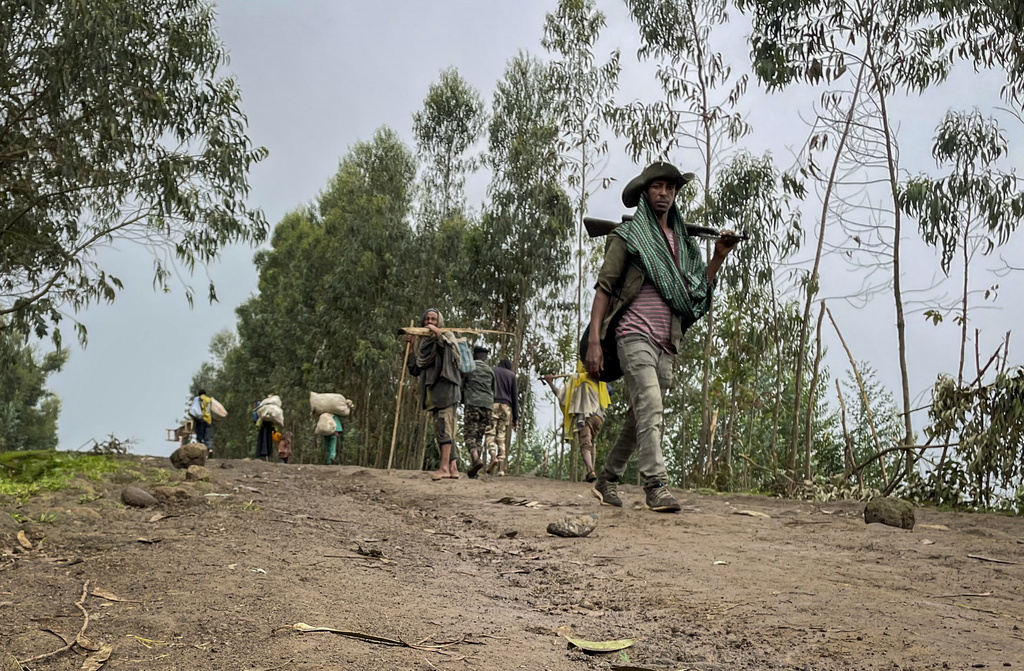ADF STAFF
Gunfire echoed between sleek glass buildings in Addis Ababa on April 12. The city’s relative peace was shattered by a shootout between security forces and three members of an Amhara militant group.
One of Ethiopia’s many ethnic and regional conflicts had spilled into the capital city, exposing ongoing nationwide security concerns.
“The extremist group members … were intercepted after being under surveillance by security forces. They were planning a terrorist attack in our city,” Ethiopian police said in a statement, noting that one civilian was killed along with two of the militants.
The men were members of the Fano militia, which has been locked in a militarized conflict with federal and regional forces in Amhara for a year. The federal government declared a state of emergency in the region in August 2023, something with which the country’s more than 80 ethnic groups have become familiar in recent years.
The Amhara conflict came on the heels of Ethiopia’s bloody civil war against Tigrayan forces in the country’s northernmost region. Researchers estimate the death toll in the two-year conflict was as high as 360,000 civilians and 500,000 fighters.
Analysts such as World Peace Foundation Executive Director Alex de Waal and his colleague, Mulugeta Gebrehiwot Berhe, say there are many root issues and few simple solutions to Ethiopia’s many-sided crises.
“A new rebellion in the Amhara region … is fast making the region ungovernable,” the researchers wrote in an April 8 article in Foreign Affairs magazine.
Amhara militias fought alongside government forces (ENDF) during the Tigray war and were accused of ethnic cleansing of Tigrayans. Near the end of the war, federal forces began arresting members of the Fano.
The peace deal caused further anger among the Amhara, who were promised positions of power, land and other spoils of war during the conflict but were excluded from the peace process. The biggest issue for Amhara was their claim to long-disputed territory in western Tigray.
After the Tigray war, Prime Minister Abiy Ahmed and the federal government announced a plan to integrate all regional forces into the national army. Fighting began in April 2023 when government forces came to disarm the Amhara fighters.
“Having set the hounds loose, Abiy now faced their snarling jaws,” the foundation analysts wrote, calling his response to the Amhara rebellion “self-defeating.”
“[Abiy sent] federal troops that have used indiscriminate violence, including drone attacks, that have outraged local communities and stiffened their resolve. Helped by defecting army officers, the Fano have increasingly turned the Amhara countryside into no-go areas.”
Other regional armed groups also continue to clash with the government. An armed wing of the Oromo Liberation Front, which represents Ethiopia’s largest ethnic group, has been fighting for decades.
The recent assassination of a prominent Oromo politician has sparked international concern over widespread extrajudicial killings and human rights violations in Ethiopia.
“Mass killings are becoming shockingly common in Ethiopia,” Tigere Chagutah, Amnesty International regional director for East and Southern Africa, said in an April 12 statement.
Since the 1990s, Ethiopia has been something of a tenuous experiment in ethnic federalism. Its 10 semiautonomous regions have local armies and the right to their own languages.
Abiy, however, has been unable to manage the country. Critics say he has pitted ethnic groups and regions against each other and allowed hate speech and violent rhetoric to flourish.
Once a beacon of stability in the Horn of Africa, Ethiopia under Abiy has become a part of East Africa’s spreading chaos. Civil war rages in Sudan to the west, while Somalia is locked in an existential battle against the well-funded al-Shabaab terrorist group.
In a quest for coastal land, Abiy has made waves by threatening Eritrean and Somali sovereignty and agreeing to recognize the independence of the breakaway state of Somaliland.
In order to avert further internal or regional violence, the foundation analysts called for an inclusive Ethiopian national dialogue with the caveat that Abiy’s ruling Prosperity Party could not veto other participants or the overall agenda.
“Once today’s spiraling crisis is arrested, Ethiopians can begin to talk their way toward a new political settlement,” they suggested. “Abiy can have a voice in this process, but it cannot be louder than others.”
“Ethiopia needs responsible leadership if it is to survive as a functioning state. Getting the country back on course will require the political elite to set aside their differences and recognize that their country may soon collapse.”

